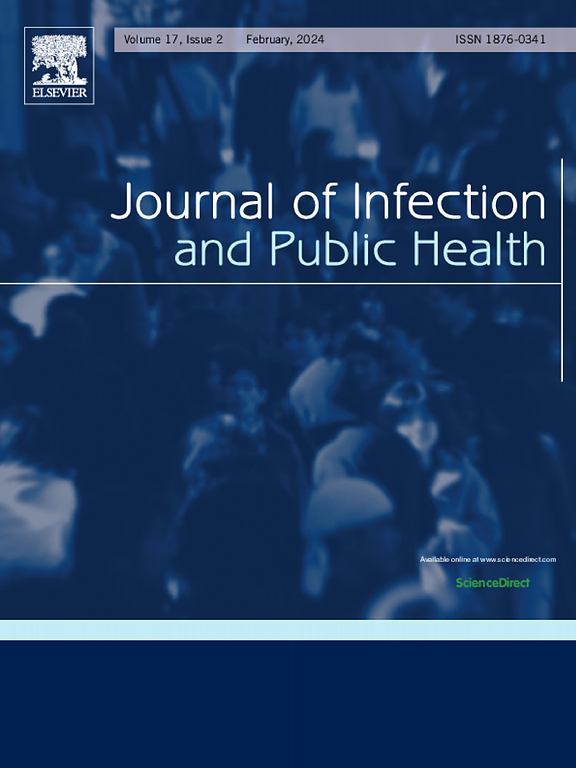维生素D缺乏症与呼吸系统健康:叙述性审查通过创新战略和可持续解决办法弥合公共卫生方面的差距
IF 4
3区 医学
Q1 INFECTIOUS DISEASES
引用次数: 0
摘要
维生素D缺乏是一个全球性的公共卫生问题,在中等收入国家和东地中海国家非常普遍。它与COVID-19和流感等呼吸道感染的风险增加有关,还与骨质疏松症和心血管疾病有关。作为一种免疫调节剂,维生素D增强巨噬细胞活性,抑制炎症细胞因子,诱导抗菌肽。观察性研究将缺乏维生素与较高的感染风险联系起来,尽管临床试验结果好坏参半。危险因素包括皮肤黝黑、年龄较大、城市生活和日晒减少。这篇叙述性综述综合了PubMed、Scopus和Web of Science等数据库中同行评议文献(2000-2025)的发现。它的重点是通过多方面的公共卫生战略解决与维生素D缺乏有关的呼吸道感染。这些措施包括政策主导的食品强化、生物强化、公众意识运动和技术创新,以增加膳食维生素D摄入量,减少全球维生素D缺乏和呼吸道感染负担。本文章由计算机程序翻译,如有差异,请以英文原文为准。
Vitamin D deficiency and respiratory health: A narrative review bridging gaps in public health through innovative strategies and sustainable solutions
Vitamin D deficiency is a global public health issue, highly prevalent in middle-income and Eastern Mediterranean countries. It is associated with increased risks of respiratory infections like COVID-19 and influenza, alongside osteoporosis and cardiovascular disease. Functioning as an immunomodulator, vitamin D enhances macrophage activity, suppresses inflammatory cytokines, and induces antimicrobial peptides. Observational studies link deficiency to a higher risk of infection, although clinical trial results are mixed. Risk factors include dark skin, older age, urban living, and reduced sun exposure. This narrative review synthesized findings from peer-reviewed literature (2000–2025) in databases such as PubMed, Scopus, and Web of Science. It focuses on addressing respiratory infections associated with vitamin D deficiency through multifaceted public health strategies. These include policy-led food fortification, biofortification, public awareness campaigns, and technological innovations to increase dietary vitamin D intake and reduce the global burden of deficiency and respiratory infection.
求助全文
通过发布文献求助,成功后即可免费获取论文全文。
去求助
来源期刊

Journal of Infection and Public Health
PUBLIC, ENVIRONMENTAL & OCCUPATIONAL HEALTH -INFECTIOUS DISEASES
CiteScore
13.10
自引率
1.50%
发文量
203
审稿时长
96 days
期刊介绍:
The Journal of Infection and Public Health, first official journal of the Saudi Arabian Ministry of National Guard Health Affairs, King Saud Bin Abdulaziz University for Health Sciences and the Saudi Association for Public Health, aims to be the foremost scientific, peer-reviewed journal encompassing infection prevention and control, microbiology, infectious diseases, public health and the application of healthcare epidemiology to the evaluation of health outcomes. The point of view of the journal is that infection and public health are closely intertwined and that advances in one area will have positive consequences on the other.
The journal will be useful to all health professionals who are partners in the management of patients with communicable diseases, keeping them up to date. The journal is proud to have an international and diverse editorial board that will assist and facilitate the publication of articles that reflect a global view on infection control and public health, as well as emphasizing our focus on supporting the needs of public health practitioners.
It is our aim to improve healthcare by reducing risk of infection and related adverse outcomes by critical review, selection, and dissemination of new and relevant information in the field of infection control, public health and infectious diseases in all healthcare settings and the community.
 求助内容:
求助内容: 应助结果提醒方式:
应助结果提醒方式:


